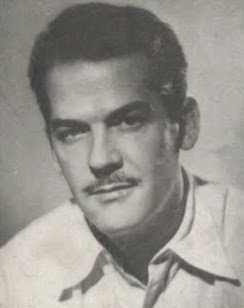For the month, the fifth of ten poems
I find interesting, amusing, and/or infuriating.
To think I once worked to celebrate this horrible man.
I first learned of John J. MacDonald – "James MacRae" – a few months after moving to St Marys, the small Ontario town he adopted as his home. That introduction came through The Four James, William Arthur Deacon's 1927 study of MacRae and fellow poets James McIntyre, James Gay and James D. Gillis.
The four are forever united by that book. Indeed, their very legacies are crafted by that book and its subsequent reissues, the last of which was published forty-eight years ago by Macmillan.
"Canada's Four Worst- And Funniest-Poets."
They're not the four worst, nor are they the four funniest.
It's all too easy to see the Four Jameses as being similar (Paper Lace), when in fact they were actually very different from one another (The Beatles). McIntyre, the most prolific, was the most grounded. Like so much of his verse, 'Ode on the Mammoth Cheese,' his greatest hit, was intended to raise a smile at country fairs. Deacon encourages us to laugh at it, when we should be laughing with it. Gay, a loving and loveable loon who thought himself Tennyson's rival, is the most fun to read. Gillis wasn't so much a poet as a prose writer. He's included for no other reason than to make for a great title.
The differences between these four men is most evident in their respective reactions to the 1880 murder of politician and Globe publisher George Brown.
Unsurprisingly, the tragedy inspired no verse from prose-writer James Gillis. James McIntyre writes of his sorrow in a poem titled 'Departed Statesman.' James Gay expresses great affection for the fallen man with 'The Honourable G. Brown.' James MacRae's 'Sad End of a Noted Politician' is something else entirely.
A different kind of loon than Gay, much of MacRae's poetry is taken up by hate thrown on women, strangers, Protestants, and Liberals.
'Sad End of a Noted Politician' comes from The Poems and Essays of John J. MacDonald, (Ottawa: Ru-Mi-Lou, 1928), the poet's third and final book.
MacDonald's nom de plume is misspelled on the cover.
SAD END OF A NOTED POLITICIAN
On a cold winter night, cruel death in its might,
Deprives Mr. Brown of his senses;
Now the joys that attend all his honours must end,
And his long night of sorrow commences.
As he hears the decree, he determines to flee
To the gate of the dwelling of glory,
But that gate he finds closed, and his entrance opposed,
Although sad to his party the story.
Thus insultingly used, thus disowned and refused,
He goes on in another direction;
At that medium place, where the Papists have grace,
He asks humbly for rest and protection.
But in vain as before for thgat rest to implore—
He must follow his downward gradation;
With the devil despite he soon meets at the gate,
And there follows this sort of conversation:—
G.B.—Disappointed and grieved, of mu comforts bereaved,
And my relatives all at a distance,
I have come to request of you leave her to rest,
And to ask your paternal assistance.
DEV.—Oh! my corpulent friend, I your case apprehend,
And will grant you coveted pittance;
If you tell me the claim that you have on the same
You will gain to my dwelling admittance.
G.B.—It is little you know in these regions below;
You must think I'm a Papist or Paddy;
As a Child if you prize the retailer of lies,
I can certainly claim you for daddy.
DEV.—You must still keep aloof till you give me some proof
On your noble and worthy exertions;
For I oft shall mistake if I venture to take
Every wandering stranger's assertions.
G.B.—In my nethermost robes I have brought you some globes,
You will find them a recommendation;
They will prove beyond doubt that I laboured throughout
In extending your own dominion.
DEV.—By the stories they tell now I know you too well,
And to have one more prudent would rather,
For, exposing my plan by the course which you ran,
You have brought disgrace on your father.
For to win the applause some men for my cause
Some discretion and caution are needed;
But, regardless of this, you have acted amiss,
And my wise inspirations unheeded.
But your failings I feel have resulted from zeal
To encourage your partners in evil;
So forgetting your sin, you may quietly come in
But you must be exceedingly civil.
Related posts:










































